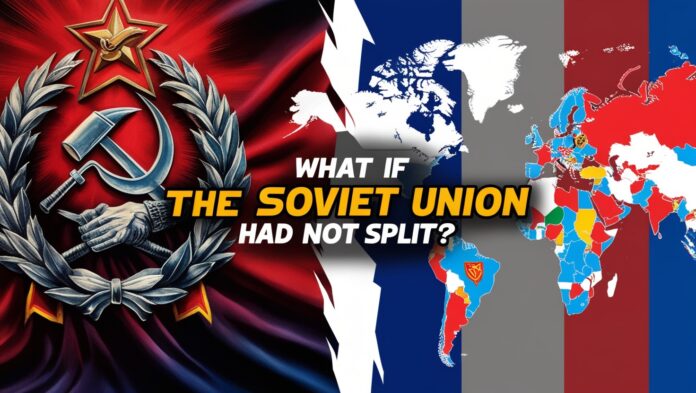The Soviet Union, once a formidable superpower, disintegrated in 1991. This collapse ended the Cold War and ushered in a new era of international relations. But what if the Soviet Union had stayed intact? What if it had managed to preserve its territorial integrity and communist ideology? This article explores the potential economic, geopolitical, social, and cultural outcomes of a unified Soviet Union.
Economic Implications of a Unified Soviet Union
If the Soviet Union had not split, it would have likely continued to grapple with its planned economy’s inefficiencies. The Soviet system was notorious for corruption, nepotism, and mismanagement, leading to widespread resource scarcity and instability. However, it’s possible the Soviet government might have undertaken reforms to address these issues. Such reforms could have potentially led to improved economic performance.
A unified Soviet Union might have adopted a market-oriented approach similar to China’s reforms in the 1980s. This shift could have spurred economic growth, attracted foreign investment, and expanded trade. With these changes, the Soviet Union could have emerged as a major economic power. However, this would require substantial reforms, including privatizing state-owned enterprises, establishing a functioning financial system, and liberalizing trade and investment.
Alternatively, the Soviet Union might have continued relying on its vast natural resources, such as oil and gas, to drive its economy. While this strategy could have stabilized the economy, it would also make the country susceptible to fluctuations in global commodity prices.
Geopolitical Consequences of a Unified Soviet Union
The survival of the Soviet Union would have had significant implications for international relations. The Soviet Union would have maintained its status as a superpower, likely continuing its influential role in global affairs. This scenario would result in a more bipolar world, with the Soviet Union and the United States vying for influence and power.
Additionally, the Soviet Union could have preserved its network of alliances and client states. This could have prevented the spread of democratic and market-oriented economies in Eastern Europe and beyond. Consequently, the world might have become more fragmented and unstable, with the Soviet Union and its allies on one side and the United States and its allies on the other.
However, there is also a possibility that increased cooperation and diplomacy between the Soviet Union and the West could have emerged. The Soviet government might have taken a more conciliatory stance, aiming to reduce tensions and negotiate with the United States and other Western nations.
Social and Cultural Effects of a Unified Soviet Union
A unified Soviet Union would have had profound social and cultural effects. The Soviet Union might have continued enforcing its communist ideology, which would limit individual freedoms and creative expression. The Soviet government could have also maintained its suppression of dissent and opposition, leading to a more authoritarian and repressive society.
On the other hand, a unified Soviet Union might have fostered greater social and cultural exchange with the West. The Soviet government could have adopted a more open and tolerant approach, encouraging increased travel, cultural exchange, and intellectual cooperation between the Soviet Union and other countries.

Alternative Scenarios for a Unified Soviet Union
Several alternative scenarios could have played out if the Soviet Union had remained united. One possibility is a gradual transition to a democratic and market-oriented economy. Similar transitions occurred in Taiwan and South Korea, leading to more stable and prosperous nations. If the Soviet Union had followed this path, it might have prevented its collapse and resulted in a more stable state.
Conversely, the Soviet Union could have faced a more violent and chaotic collapse. This scenario might have led to widespread conflict and instability, with significant implications for international relations. A more tumultuous collapse could have resulted in a more divided and unstable world.
Conclusion
The hypothetical scenario of a unified Soviet Union presents numerous economic, geopolitical, social, and cultural consequences. Although it’s impossible to predict exactly how events would have unfolded, it’s clear that a unified Soviet Union would have been a major player in international affairs, potentially shaping global events for decades.
The collapse of the Soviet Union was a pivotal moment in modern history, marking the end of the Cold War and the start of a new international era. While we cannot alter the past, considering these hypothetical outcomes offers intriguing insights into what the future might have held.

